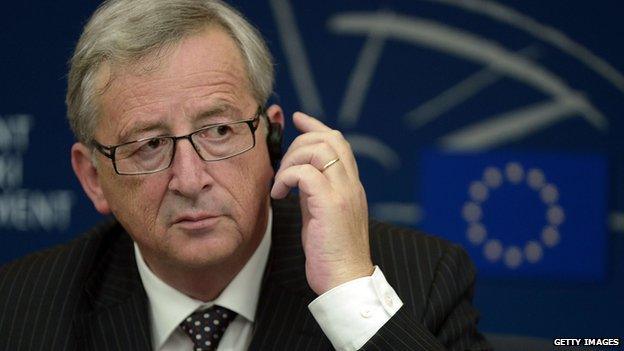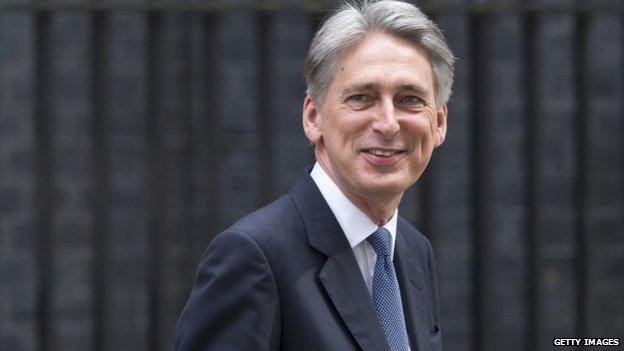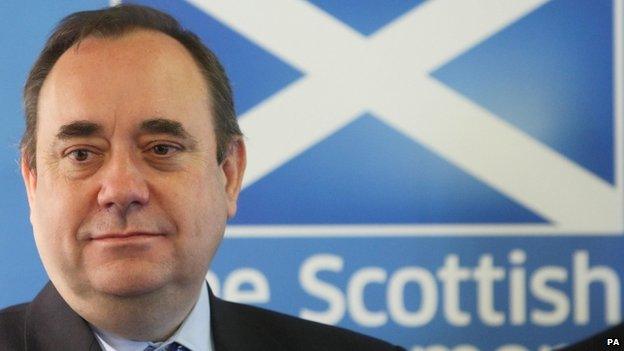Three momentous events
- Published

The European Parliament has approved Jean-Claude Juncker as European Commission president
Three events: each significant, each with a longer term impact.
Of the three, the greatest significance may ultimately lie not with the new and unexpected but with the development which was forecast and scheduled.
That element of the trio is the confirmation of Jean-Claude Juncker as EU Commission president, with his endorsement by the European Parliament.
Mr Juncker will have major influence over whether the reforms to the EU sought by the Conservatives succeed or stall.
That could determine the future of the UK in Europe - and, incidentally, of the Conservative Party.
The significance of his appointment - despite opposition from David Cameron - is underlined once more today with, for example, Scots Tory MEP Ian Duncan arguing that the new president must bow to demands for change.
The others in the trio?
There is the UK's nomination of Lord Hill, the leader of the House of Lords, to serve as Britain's commissioner in the restructured EU power bloc.
He is said to be a deal-maker, a fixer. Perhaps his experience in the Lords, cajoling the zealous, the disaffected, the puzzled and the truculent, enhanced his CV.
Avoiding the need for a by-election probably helped too.
The third element of course is the small matter of the substantial reshaping of David Cameron's cabinet - or, more precisely, the majority section of the coalition team over which he has direct control (Nick Clegg being seemingly content for now).
It is undoubtedly influenced by a range of factors: the ever-present search to refresh, the wish to promote women and the need to subdue Michael Gove's eager combat with elements of the educational establishment in England.
Above all, though, this is about another ever-present political motive - the will to win.
Eurosceptic minister
David Cameron calculates that he needs to offer a more keenly honed edge to the electorate than was seemingly feasible with the departing team.
And, as ever with the modern Tories, there is one more constant: argument over the European Union.
The new Foreign Secretary, Philip Hammond, is emphatically Eurosceptic.
But then that is the default position for contemporary Tories, especially now that Kenneth Clarke is again a backbencher. Mr Hammond's predecessor, William Hague, was scarcely a Euro-enthusiast.
And so the Tory disquiet over Europe persists.
All political parties are, more or less, coalitions of convenience as well as conviction. They hold together in pursuit of power.
Sometimes, as with the 19th century Liberals over Irish home rule or, earlier that century, the Tories over the Corn Laws, an issue arises that trumps the desire to coalesce and outweighs unity.
For decades now, the issue of Europe has posed that potential challenge to the Conservatives.
Some have gone to UKIP. Some have grumbled, politely. Many more have obeyed Disraeli's attributed dictum: "Damn your principles, stick to your party."
Now, once more, the Tories are confronting the issue.
David Cameron has promised to seek a renegotiation of Britain's terms of EU membership, to be followed by a referendum on the issue of whether that reformed membership should be sustained or abandoned.

New foreign secretary Philip Hammond is seen as a "tough Eurosceptic"

First Minister Alex Salmond believes Mr Hammond's appointment is part of a prolonged march out of the EU
It is possible to see Philip Hammond's appointment in that context: as a tough Eurosceptic who will appeal to that wing of the party while driving a hard bargain in EU negotiations in consort with the more emollient Lord Hill.
Alex Salmond sees it rather differently. He says that appointing Mr Hammond to the post of Foreign Secretary is part of a prolonged march out of the EU, driven by the Conservatives.
This, of course, matches Mr Salmond's narrative in another way.
It presumes that the Conservatives win the next UK general election and are, thus, in a position to influence events in Europe either way.
Mr Salmond calculates that the people of Scotland would mostly prefer an absence of Conservative governance and continued membership of the EU. His argument is that both can be obtained via independence.
Momentous events
Naturally, his rivals have a different take although, of course, that take varies according to party.
Many, however, have seized upon Mr Juncker's comments today that there should be a pause placed upon enlargement of the EU.
This, say Mr Salmond's critics, means that there is a further impediment in the path of an independent Scotland securing membership of the European Union.
No, say Mr Salmond's supporters, this applies to entirely new applicant countries. They continue to argue that a distinctive arrangement could be made for the people of Scotland who have been EU citizens for decades via the UK.
For the UK and for Scotland, these are momentous events.